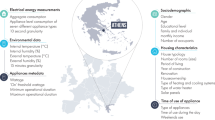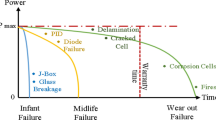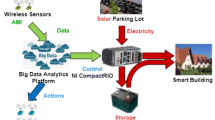Abstract
In the context of smart grid, home energy management system (HEMS) needs to collect the fine-grained energy consumption data through smart meters. However, the fine-grained data contain the electricity consumption patterns of consumers, which can induce serious privacy issues. In order to protect the electric privacy of consumers, a privacy-aware electricity scheduling strategy for HEMS is proposed in this paper. Firstly, the basic scheduling model of HEMS is presented, and the basic scheduling objective is to minimize the electricity payment while satisfy the daily power demands of consumers. On this basis, a privacy-aware optimal scheduling model adopting rechargeable batteries is established, and the introduction of preference factor enables consumers to make a tradeoff between the total operation cost and privacy security. The electric privacy protection performance is measured by coefficient of determination and the number of features. Besides, the operation cost of batteries is also considered in the modeling process, and the influence battery capacity has on the performance of privacy protection is discussed. Simulation results show that the proposed method is effective and has strong practical application value.



Similar content being viewed by others
References
Albadi MH, El-Saadany EF (2008) A summary of demand response in electricity markets. Electr Power Syst Res 78(11):1989–1996
Lee JI, Chang SC, Wan KP, Lee IW (2012) Home energy management system internetworking with advanced metering infrastructure. pp 297–298
Hart GW (1989) Residential energy monitoring and computerized surveillance via utility power flows. IEEE Technol Soc Mag 8(2):12–16
Hart GW (1993) Nonintrusive appliance load monitoring. Proc IEEE 80(12):1870–1891
Mahmud R, Vallakati R, Mukherjee A, Ranganathan P (2015) A survey on smart grid metering infrastructures: threats and solutions
Pipattanasomporn M, Kuzlu M, Rahman S (2012) An algorithm for intelligent home energy management and demand response analysis. IEEE Trans Smart Grid 3(4):2166–2173
Pedrasa MAA, Spooner TD, Macgill IF (2010) Coordinated scheduling of residential distributed energy resources to optimize smart home energy services. IEEE Trans Smart Grid 1(2):134–143
Arabali A, Ghofrani M, Etezadi-Amoli M, Fadali MS, Baghzouz Y (2013) Genetic-algorithm-based optimization approach for energy management. IEEE Trans Power Delivery 28(1):162–170
Efthymiou C, Kalogridis G. (2010) Smart grid privacy via anonymization of smart metering data. pp 238–243
Lam HY, Fung GSK, Lee WK (2007) A novel method to construct taxonomy electrical appliances based on load signaturesof. IEEE Trans Consum Electron 53(2):653–660
Khalid Q, Arshad N, Khan N, Hassan T, Javed F, Ikram J (2014) Home energy management system using NILM and low-cost HAN. Journal of Electronic Science & Technology 1:20–25
Erkin Z, Troncoso-Pastoriza JR, Lagendijk RL, Perez-Gonzalez F (2013) Privacy-preserving data aggregation in smart metering systems: an overview. IEEE Signal Process Mag 30(2):75–86
Kalogridis G, Efthymiou C, Denic SZ, Lewis TA (2010) Privacy for smart meters: Towards undetectable appliance load signatures. pp 232–237
Varodayan D, Khisti A (2011) Smart meter privacy using a rechargeable battery: minimizing the rate of information leakage 45(1):1932–1935
McLaughlin S, McDaniel P, Aiello W (2011) Protecting consumer privacy from electric load monitoring. pp 87–98
Li N, Chen L, Low SH (2011) Optimal demand response based on utility maximization in power networks. pp 1–8
LINGO[Online]. Available: http://www.hearne.software/Software/lingo http://www.hearne.software/Software/lingo. Accessed 3 Feb 2016
Ruan B, Yang Q, Fang X, Yan W (2014) Demand response under real-time pricing for domestic energy system with DGs. pp 3103–3110
AMEO [Online]. Available: http://www.aemo.com.au/Electricity/Data/Price-and-Demand/Aggregated-Price-and-Demand-Data-Files/Aggregated-Price-and-Demand-2011-to-2015 http://www.aemo.com.au/Electricity/Data/Price-and-Demand/Aggregated-Price-and-Demand-Data-Files/Aggregated-Price-and-Demand-2011-to-2015. Accessed 3 Feb 2016
Acknowledgments
This research was supported by National Natural Science Foundation of China(61202369), Shanghai Technology Innovation Project (13160500900, 14110500900), and Innovation Program of Shanghai Municipal Education Commission (13YZ102).
Author information
Authors and Affiliations
Corresponding author
Rights and permissions
About this article
Cite this article
Yang, J., Huang, G. & Wei, C. Privacy-aware electricity scheduling for home energy management system. Peer-to-Peer Netw. Appl. 11, 309–317 (2018). https://doi.org/10.1007/s12083-016-0492-x
Received:
Accepted:
Published:
Issue Date:
DOI: https://doi.org/10.1007/s12083-016-0492-x




